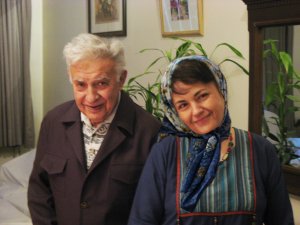Her Excellency Madam President of the Brazilian Republic, Dilma Rousseff
The Palácio do Planalto
Brasilia
Brazil
Your Excellency,
Madam President, first of all, we would like to offer you our congratulations on the occasion of International Women’s Day. We hope that, with the backing of the votes of people of Brazil, you will be able to help realize the demands of your country’s women’s movement. We hope that the solidarity between the people of Brazil and Iran will be strengthened and deepened by the consolidation of friendly relations based on the quest for freedom and equality, and, in particular, the struggle against all forms of gender oppression in our societies.
Madam President, two main reasons have led us, a group of Iranian women’s rights activists, to write this letter to you:
Firstly, you are the first woman to be elected President of Brazil; you have been a distinguished fighter for Brazil’s democracy movement; you were once a political prisoner yourself and know the meaning of torture and of physical and psychological abuse.
The second reason is the extensive diplomatic and economic relations between Iran and Brazil built up and cultivated by governments prior to yours. As a rule, statesmen or stateswomen who in their relations with other countries consider nothing but their country’s economic and political interests do not receive our particular attention. But your long history of activism in the course of your nation’s struggles for democracy motivated us to request from you that, in your negotiations with the Iranian government, you object to violations of women’s rights and individual liberties, and consider the interests of Iranian citizens and the issue of human rights and women’s rights in your relations with the Iranian government.
Madam President, the situation as regards discrimination against women in Iran is deplorable. For example, in the sphere of political rights, both owing to legal ambiguities in the Iranian constitution, and because of government bodies overseeing elections, such as the Guardian Council, no woman can become president of Iran.
In the realm of family law, current laws do not grant women equal rights with men, and solely because of their gender, women are required to seek permission from their husbands or their paternal family members to be allowed to travel, choose a job, and receive an education. The right to guardianship of a family is solely bestowed upon a man; girls do not have independence in choosing their husbands, and they can only get married with the permission of their fathers and paternal grandfathers. Honor crimes committed against women and the green light the law offers men in such cases have increased acts of domestic violence against women. Women do not have equal divorce rights, and laws such as those allowing polygamy for men have caused severe problems for many women.
In the area of civil rights, women are deprived of the right to freely choose their own clothing and face daily police violence if they fail to comply with the obligatory Islamic dress code. Female university students face gender discrimination in universities, and just like male students, many of them are currently either in prison or in exile or have been banned from pursuing their education for voicing criticism or expressing their opinions. Labor, ethnic, and minority religious activists have been subjected to legal brutality because they objected to the violation of their rights, or because they defended the right to an education in their mother tongue, or because they protested against poverty and deprivation. Female dissidents such as Shirin Alam Hooli, a Kurdish activist, have been executed because of their political activism. Executions and long detentions of prisoners are on the rise.
The existing legal inequalities have led to increased repression and violence against women in all areas of social and family life and to legal violence against women. The brutal punishments of execution and stoning have taken the lives of many women who, faced with legal dead-ends, have tried to find individual solutions to their misery.
Madam President, in the face of this violence, Iranian women have not remained quiet. Many legal experts and human rights and women’s rights lawyers have protested, whether in individual or group actions or through numerous campaigns; but their protests have resulted in detentions, exile, and education bans. We shall name a few examples: Bahareh Hedayat, a students’ rights and women’s rights activist, was sentenced to nine years in prison for reading a statement addressed to university students around the world and for participating in a protest together with other women.
Shiva Nazar Ahari, a human rights reporter, women’s rights activist, and a university student banned from continuing her education, was sentenced to four years in prison in exile and flogging. Nasrin Sotoudeh, a human rights lawyer, has been in prison since last September and sentenced to eleven years’ imprisonment on charges of defending her clients, the majority of whom are women’s rights, student rights and labor activists or deprived women and children sentenced to death, as well as for giving interviews to the media.
You know through experience that in order to legitimize the suppression of people, activists, and people’s movements, those in power may accuse and convict people on fabricated charges and crimes. You, who have fought for the Brazilian people’s dignity and freedom, know that idealists are constantly accused by those in power of cooperating with foreigners or similar offenses deemed worthy of punishment. Many ethnic rights activists, journalists, labor and political activists have recently been handed heavy sentences for such alleged crimes.
Madam President, the only aspiration of the struggling women of Iran is to promote their own and their sisters’ awareness and efforts to change their discriminatory circumstances. After many years in prison, Zeinab Jalali, a young Kurdish woman and a labor movement activist, is now awaiting execution. Families have been thrown in prison for objecting to their children’s detention or killing.
Madam President, the world is now hearing the voice of Iranian people, a voice that is completely separated from the voice of the Iranian government and those in power. We believe that Brazil’s long-term interest is intertwined with Iran’s democratic growth and consideration for the political and civil rights of Iranian citizens. Brazil’s interests and a profound and equal relationship between your nation and ours can only be realized within the framework of respect for the mutual ideals of the people of both countries.
We ask that you, in whatever kind of relationship you envisage with Iran in your own political program, you show the women of Iran and the world that, as the first woman president of Brazil, you are standing by them and that you object to the violation of the rights of Iranian women and of the citizens of Iran.
Yours sincerely,

